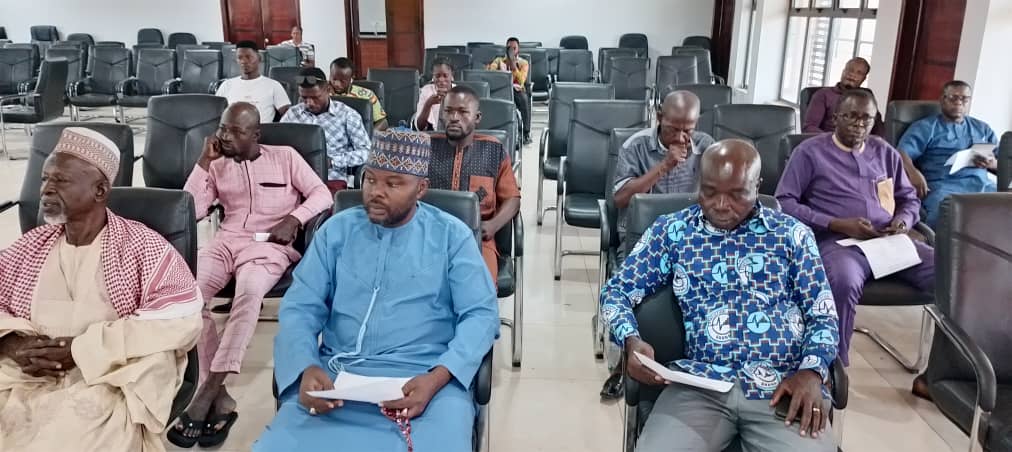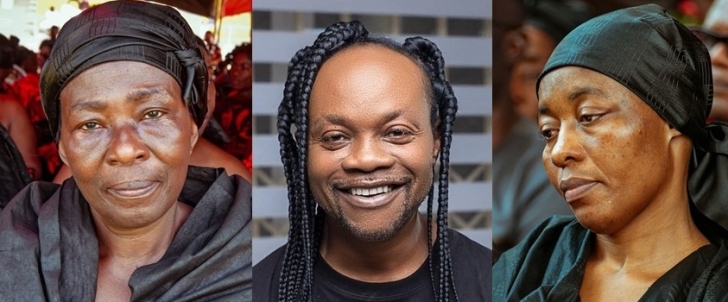The Bono East Regional Office of the Ghana Statistical Service (GSS) has presented key findings from the second wave of the national Governance Series Wave 2 during a dissemination forum held at the Regional Coordinating Council Conference Hall on Friday, August 20, 2025.
The presentation formed part of activities marking this year’s African Statistics Day, celebrated under the theme “Leveraging innovation in data and statistics to promote a just, peaceful, inclusive and prosperous society for Africans.”
The Governance Series conducted using Computer-Assisted Telephone Interviewing (CATI), assessed citizens’ experiences and perceptions regarding inclusiveness, responsiveness, and bribery in public institutions, comparing findings from the first wave in 2024 to the mid-year 2025 results.
According to the report, bribery within public institutions has seen a marginal decline, dropping from 18.4 percent in 2024 to 14.3 percent in the first half of 2025. The GSS attributed this progress to growing public awareness and ongoing reforms aimed at improving transparency in governance.
Despite the decline, the Service noted that bribery still affects key sectors, with money remaining the most dominant form of illegal exchange. It also highlighted an increase in non-monetary bribery, particularly the use of personal favours, which disproportionately affects women.

The Governance Series also revealed improvements in public perception of inclusiveness in decision-making, rising from 54.8 percent in 2024 to 68.4 percent in 2025.
The Bono East Regional Statistician, Richard Kumashie, in his opening address, explained the importance of data in shaping governance and national development. He noted that African Statistics Day is more than symbolic, describing statistics as the backbone of development that illuminates realities, guides decisions, and informs reforms.
“Thank you for joining us as we commemorate the 2025 African Statistics Day and launch Ghana’s Governance Series Wave 2 Report. Today’s theme asks us to think deeply about the kind of society we want to build, one that is just, peaceful, inclusive, and prosperous.
“The truth is that none of that happens without good data. Not guesses, not assumptions, but real evidence that tells us how people live, what they face, and where our systems fall short. African Statistics Day is not symbolic. It’s a reminder that statistics are the backbone of development. They shine a light on realities we would rather not confront, and they guide decisions that shape our future” He said.
He revealed that the survey, conducted between 28 July and 20 August 2025, covered citizens’ experiences from January to June 2025, providing insights on bribery, responsiveness, and inclusiveness in governance compared to the first wave in 2024.
Key findings of the report revealed:
-
Bribery and corruption (SDG 16.5.1): Overall prevalence fell from 18.4% in 2024 to 14.3% in 2025, although frequent bribery increased among those involved. Money remains the dominant form, while personal favors, affecting women disproportionately, are on the rise. Direct requests for gifts from officials dropped from 51.3% to 38.6%, while voluntary gifts almost doubled. Reporting of bribery to authorities declined, signaling waning public confidence.
-
Inclusiveness and responsiveness (SDG 16.7.2): Citizens feeling included in decision-making rose from 54.8% to 68.4%, while those feeling completely excluded dropped from 42.4% to 29.2%. Youth, older adults, and persons with disabilities reported greater inclusion, though exclusion remains highest in the North East, Upper East, and Northern regions.
-
Citizens’ expectations over the next six months: More than half (52.6%) prioritized improved infrastructure and public services, while 25.9% emphasized economic stability, jobs, and business support. These priorities highlight areas where citizens expect government action.

Richard Kumashie
According to him, governance goes beyond political authority, including economic and social decision-making processes that affect all citizens. He highlighted three key areas of the report: Governance, responsiveness and inclusiveness.
“When we talk about governance, it refers to the the exercise of political, economic and administrative authority at all levels in the management of the country’s affairs while responsivenessis having an influence on politics, that’s the feeling that decision makers listened and act on one’s opinions, demands or preference.
“When we talk about inclusiveness, we mean citizens having a say in what the government does” He told our reporter.
He added that the report pays special attention to bribery and corruption, drawing its relevance from SDG Goal 16, which focuses on justice, peace, and strong institutions. He disclosed that data is the country’s most reliable tool for assessing how far Ghana has progressed toward achieving this goal.
“Now the focus is on bribery and corruption and this is not in a vacuum because, as we are aware, we have 17 SDGs that at the end of the day, we measure to know how far we have come as far as achieving the goals are. So the work that we have done is focusing on SDG Goal 16, which basically talks about justice, peace, and fairness.
“It is this data that will give us, that will tell us as a country, how far we have come when it comes to achieving this goal, so it is the data that will tell us that okay, as a nation, this is how far we have come, and if there’s any gap, we must quickly fill in the gap so that at the end of the day, we can say that when it comes to SDG Goal 16 we have achieved it or not.”
He urged all stakeholders, including government, civil society, academia, development partners, and the media, to use the findings to strengthen accountability, transparency, and citizen engagement.
“The Governance Series is more than a report. It’s a roadmap for SDG 16. Evidence must guide reforms, shape advocacy, and inform debate. If we want peace, justice, inclusion, and prosperity, then we must treat statistics as the language of development.” Mr. Kumashie added.
The Bono East Regional Statistician, called for the innovative use of data to transform lives, build trust, and secure a better future for all Africans, while acknowledging the contribution of partners such as CHRAJ, GACC, Transparency International Ghana, ACEPA, Hewlett Foundation, CDD-Ghana, and all survey respondents.
The Senior Development Planning Officer at the Bono East Regional Coordinating Council, Tika Abdul-Razak, speaking on behalf of the Regional Coordinating Director, Issaka Basentale, revealed that the current report covers only half of the year, with a comprehensive full-year report expected by the close of 2025. He therefore urged the public and state institutions to intensify their commitment to integrity and transparency to further reduce incidents of bribery involving public officers.
He stated that reducing corruption remains critical to promoting development in both the Bono East Region and the country at large.

“Going through the dissemination, we’ve realized that the rate of corruption has dropped slightly from 18.4% to 14.3%, that is comparing it to the first wave of dissemination that was done in 2024.
“Though this one is still half year, the full year one will be done by the close of the year, we still need more improvement so that the rate of taking bribe or giving bribes to public offices will reduce and hat will help in developing the region and the country as a whole.”
The Executive Director of the Centre of Posterity Interest Organization, Mustapha Maison Yeboah, who participated in the forum, urged citizens to uphold integrity in the fight against corruption.
“Bribery and corruption is dishearting as it destroys the country, so we as citizens should always stand firm on our integrity in order not to engage in anything related to bribery and corruption.” He stated.
He encouraged victims, particularly women who may face coercion in offering bribes for jobs or services, to report such demands to appropriate authorities. Civil society groups, including COPIO, were cited as additional channels through which complaints can be filed to ensure corrective action.
Mr. Yeboah also advised citizens to always demand receipts for payments at government institutions, stressing that no payment should be made if receipts are not provided.
“We have learnt that women usually fall victim in paying with other services in a form of bribery to get what they want especially jobs, I will encourage them to report any such demands to the appoperiate quaters and can report that person to the Centre of Posterity Interest Organization and we will ensure that the right thing is done.

“We should also bear in mind to demand for reciept whenever we are making payments at any government institutions and if we are told there are no receipt for the payment, then we should not pay.” He told our reporter.
The Governance Series report for Bono East is the tenth regional dissemination, following its national launch in Accra. GSS officials urged stakeholders, including civil society and traditional leaders, to use the findings to strengthen accountability and improve development outcomes across the region.
Source: Elvisanokyenews.com







Leave a Reply